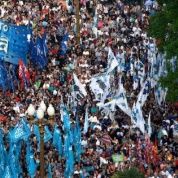Over the last 15 years, progressive governments in Ecuador, Bolivia, Argentina, Venezuela and Uruguay have approved important legislative initiatives, challenging the structure of media ownership and creating alternatives to hegemonic models of communication.

In several countries in the region, at least one third of all broadcasting frequencies have been designated for community or alternative media sources.
However, attempts to diversify media ownership have been complicated in countries like Argentina where the right-wing secured significant electoral victories in 2015.
IN DEPTH: Don't Silence teleSUR
Only days after being sworn into office, Argentine President Mauricio Macri wasted no time in announcing his administration’s plan to empower corporate media conglomerates by dismantling the country’s state-run media watchdog, which was created under the 2009 Media Law.
The Media Law introduced in 2009 implied major changes in terms of ownership, specifically challenging media monopolies by lowering the threshold on the number of media outlets that can be owned by a single entity.
Media giant Clarin Group fought the legislation in courts for years, complaining the law would force it to sell off some of its operating licenses.
Meanwhile, the recent decision by the government of Mauricio Macri to effectively take regional news broadcaster teleSUR off the air in Argentina, forms part of his administration’s larger overhaul of the country's media laws.
The recent move to eliminate teleSUR from the airwaves comes after Argentine officials had publicly lamented the alleged lack of plurality of voices in the media.
However, despite government claims to try to create a more plural media environment, critics argue that Macri's efforts to ban teleSUR represents an assault on the country’s 2009 Media Law and an attempt to further solidify the country’s already notoriously monopolized media market.
Like Macri, Argentina’s largest media conglomerate Clarin Group, view the 2009 Media Law – which sets aside a certain number of broadcast licenses for community groups like churches and cultural organizations – as a restriction on private property and press.
A recent study conducted by the Open Society Foundations concluded that the “concentration of property” in Argentina represents a significant impediment to media diversity.
“The concentration of property in multimedia groups, such as Clarin, that have dominant positions in print, radio, and free-to-air and pay television, restricts diversity,” the report noted.